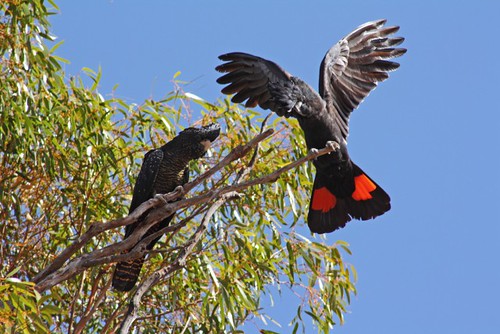Black hipsters of the air are hanging out on the north coast
 Monday, May 11, 2015 at 11:41
Monday, May 11, 2015 at 11:41  Red tailed black cockatoos. Image by Bill & Mark BellDuring late autumn and winter, black cockatoos are looking to start a family with their partners. This will mean plenty of show-off behaviour around the neighbourhood from some stylish males.
Red tailed black cockatoos. Image by Bill & Mark BellDuring late autumn and winter, black cockatoos are looking to start a family with their partners. This will mean plenty of show-off behaviour around the neighbourhood from some stylish males.
Just like the hipster human equivalents, strutting their stuff down uber-trendy streets, the male black cockatoos are preening themselves and combing their quiffs in an effort to impress the ladies.
‘There are five black cockatoo species in Australia and they can be found across much of the country,’ said Ms Susanna Bradshaw, CEO of the Foundation for National Parks & Wildlife.
Ms Bradshaw said, ‘There are three types of black cockies in New South Wales. The Red-tailed Black Cockatoo is more common in northern New South Wales and rural areas, the Yellow-tailed Black Cockatoo is common along the coast and around Sydney, and the endangered Glossy Black Cockatoo population is scattered along the coastline.’
‘Unlike their Sulphur-crested cousins, black cockatoos do not damage houses and only eat fruit crops when their native foods are low or missing,’ said Ms Bradshaw.
‘The distinctive cry of black cockatoos as they fly past on a crisp autumn day is a very sentimental Australian sound. Their intelligent and gentle nature is also a delight to witness. These unique Aussie birds are very deserving of our help to make our suburbs and towns better places for them,’ Ms Bradshaw said.
 Endangered Glossy black cockatoos. Image by Felicity HarveTips for living with black cockatoos
Endangered Glossy black cockatoos. Image by Felicity HarveTips for living with black cockatoos
- With the extreme weather battering the eastern coast of Australia recently, many people are turning to the chainsaw to remove large trees from their properties. It is these big trees that many Australian animals depend on for nesting and protection. Land clearing is the single biggest threat to the black cockatoo. So please seek professional advice before removing trees and leave them be if they are safe or away from pedestrian areas so that beautiful black cockatoos and many other creatures can enjoy the trees for years to come.
- To encourage black cockatoos into your backyard, plant their favourite foods such as casuarinas, native pine trees, banksias and tall eucalypts.
- Radiata Pine is very popular with Yellow-tailed Black Cockatoos who love to eat the pinecones. However, these trees are introduced and highly invasive. Before removing these large trees, try to build up native trees nearby so that the cockatoos will still have somewhere to eat and hang out.
‘Don’t get the wrong idea about these show-off males. They are not just about looks, they’re also very intelligent and loving,’ said Ms Bradshaw. ‘The cockatoo pair will mate for life, which can be over 50 years, and they will care for each other into their old age, even after they can no longer reproduce.’
‘The male black cockatoo will dance to impress his mate by bopping his head like a hip-hop star and fluffing up his crest. He will also bring her food gifts, sing to her and preen her feathers to show his affection during the autumn breeding season. The female will often give the male a sharp peck for his efforts as if bringing him into line,’ said Ms Bradshaw.
Ms Bradshaw said, ‘Their gregarious and loving nature has made black cockatoos popular pets. Sadly there is a black market trade of these birds, particularly in the U.S. where they fetch the highest price. Because they are slow at reproducing, poachers illegally taking babies and eggs has significantly affected their wild numbers.’
 Yellow tailed black cockatoos. Image by Wayne ButterworthInteresting facts about black cockatoos
Yellow tailed black cockatoos. Image by Wayne ButterworthInteresting facts about black cockatoos
- Black cockatoos are the biggest parrots in Australia.
- Most black cockatoos lay two eggs, however only one chick will survive. The chick will stay with its parents for around six months, making these birds very slow reproducers.
- Old Australian bush lore suggests the screeching of a black cockatoo means that rain is on its way, so keep an ear out for their distinctive cry so you can bring your washing in on time!
For more information
Backyard Buddies is a free program run by Australia’s Foundation for National Parks & Wildlife. Each month, you get a Backyard Buddies email (B-mail) with tips to make your backyard inviting and safe for native animals. Black cockatoos featured in May B-mail. Sign up for B-mail and download a free factsheet about black cockatoos at www.backyardbuddies.net.au.

